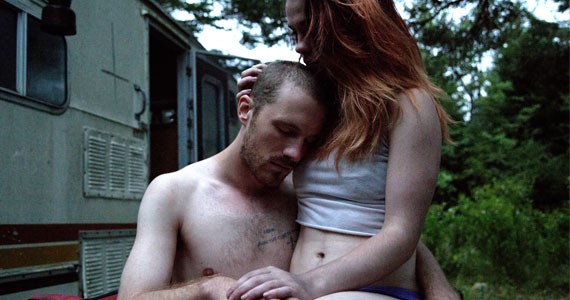"I do what feels right to me, and I follow my instincts," says Ashley McKenzie, the director, writer and editor of Werewolf, her debut feature. "I had a feeling, writing the script, knowing we should never see the ocean. Growing up in and now living in a town where I can look out a window and see the ocean, it's a very commonplace thing. But in my mind, these characters, they could never see a horizon line, it's just not what their life is."
McKenzie is on the phone from her home in New Waterford, where she grew up and where she has been living since 2012 after a stint in Halifax. The protagonists of Werewolf, which screens Sunday, September 18 at the Atlantic Film Festival, are Nessa (played by Bhreagh MacNeil) and Blaise (Andrew Gillis), drug addicts in a methadone program, spending their days pushing a broken-down lawn mower around to try to make ends meet, plot by scraggly plot. They have access to a small camping trailer but are essentially homeless. Sometimes their young love pokes through the banal fog of their twin illnesses, but mostly it doesn't. This isn't your tourism industry's Cape Breton.
"The main thing that drove me while making this film was seeing young people around me who live here and die here and never, ever get off island. That was the narrative that I felt like I was being surrounded with in the years I was developing the film," which began forming on her move home four years ago, says McKenzie. "What about the people who are stuck here? What about the people who never get to see the island of Cape Breton? Who never leave New Waterford?"
This isn't your film industry's movie, either. Frustrated by what she repeatedly refers to as the sundry "complicated" steps to making a film in Nova Scotia, regardless of the state of the tax credit (and Werewolf is owed 50 grand from the new one: "We haven't actually gotten the money yet."). McKenzie and her production partner, Nelson MacDonald, made their feature on a microbudget from Telefilm, with local, non-professional actors and non-union crew. (They are a team and it is a team of two.) Their interim financing did not come from a bank (complicated); they spread it across their own credit cards.
Nor did they stick with Telefilm's original financing vision, which would have allowed for a higher budget but had them work with a producer they didn't know (complicated), rather than the friend they applied with Jason Buxton (Blackbird).
"We want to work with someone we trust and who understands us, we don't want to spend all our time trying to have dialogues with people who don't understand our film or what we're trying to do," says McKenzie. "We have enough battles to fight trying to make a film in a super-guerilla way." McKenzie received scriptwriting grants from both the Canada Council of the Arts and Arts Nova Scotia instead, and the production was funded through Telefilm's microbudget program, which caps budgets at $250,000.
The choice to cast outside the union was both creative and economical (plus MacNeil and Gillis are terrific). ACTRA actors come with a set of rules—lodging and specific working hours among them—which McKenzie and MacDonald have dealt with on short films. "We wanted a shooting schedule that was a bit more free and relaxed. With this film, we were changing the script every night, we were making up new scenes, we would have a call sheet pretty much every time, but we'd show up and throw it away," says McKenzie. "I'd have things scribbled on a piece of paper, just tell people what we were gonna shoot each day. Creatively, that was excellent, and I felt like the film evolved from the script in the shooting. That was something we wanted to do in the shorts, but we couldn't, because we were locked into these budgeting and schedule constraints."
Every compromise not accepted, every easier road walked away from, every industry standard subverted in the name of artistic vision—all of this is evident onscreen in Werewolf, which begins with a suicide and rarely looks up from there.
It's a simple, relatable story, but not one minute of it is handed over, and to increase the difficulty it's shot mostly in tightly composed frames, close to faces and objects, where the action or dialogue or both may happen offscreen. It's so quiet, yet demands your attention.
"There's this John Ford quote where he said, 'There's 100 places you can put the camera, but only one right place.' We just kept moving the camera around until I found the place that just felt like the best place," says McKenzie, who also edited the movie. "And I just trusted that if I put that through my sensibility and my taste, and I don't settle until I find the thing, if it's all going to come through me, in the end one vision will be distilled."
Oftentimes, the director put her actors into real scenarios, as when Nessa gets a fast-food job—"We had Bhreagh in the kitchen while the Tasty Treat was open," McKenzie says, "and there were orders coming in and they just started training her on the fly"—or shot past the scripted scene, "then new scenes would happen in the moments after the actual scene and that's what we would end up using."
Few things about Werewolf are conventional, down to the horror-movie name for a relationship drama (the working title was Train Whistle Does Not Blow). It is exactly what McKenzie wanted—a singular vision, distilled—and that vision is exciting and refreshing, but also challenging. Unsurprisingly, she does not care.
"It will get too complicated," she says, and there's that word again, "if I start thinking about what other people wanna see. How do you even make artwork, if that's on your mind?"
Werewolf At the Atlantic Film Festival Sunday, September 18, 9:45pm Empire 8 Park Lane $15/$13.50

